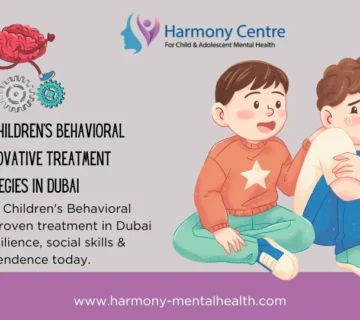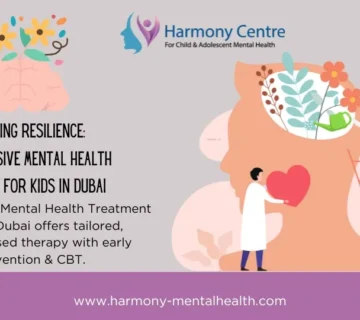Teen Suicide Prevention Dubai: Lifesaving Strategies and Support at Harmony Centre
Learn expert strategies for teen suicide prevention in Dubai at Harmony Centre. Our evidence‑based, multidisciplinary approach offers early intervention and comprehensive support.
Contact Information
| Contact Method | Details |
|---|---|
| Phone | +971 (52) 8773268 / 04 558 2015 |
| Click Here | |
| info@harmony-mentalhealth.com | |
| Address | Office 409, Building Alrazi-64C, 26th St, Healthcare City, Dubai |
Introduction
Teen suicide is a critical public health concern in today’s fast‑paced, competitive society. In Dubai, where academic pressure, cultural challenges, and rapid social change intersect, the risk factors for teen suicide are significant. At Harmony Centre Mental Health Dubai, we are committed to saving lives through early intervention and a comprehensive support system. Our multidisciplinary team employs evidence‑based practices to identify warning signs, provide timely interventions, and offer ongoing support to at-risk teens and their families. This article outlines key strategies for teen suicide prevention, offers practical guidance for parents and educators, and highlights the benefits of our integrated approach.
Learn More About Harmony Centre • Contact Us
Understanding Teen Suicide Prevention
What Is Teen Suicide Prevention?
Teen suicide prevention involves identifying risk factors, providing early intervention, and offering support systems to reduce the risk of suicide among adolescents. This comprehensive process includes mental health assessments, crisis intervention, counseling, and community outreach—all designed to create a safety net for vulnerable teens.
Key Elements of Suicide Prevention
- Early Detection:
Identifying warning signs and risk factors before they escalate. - Crisis Intervention:
Immediate support during moments of acute distress. - Ongoing Counseling:
Providing regular therapy sessions to address underlying mental health issues. - Family and Community Support:
Engaging families, schools, and communities in creating a supportive environment. - Educational Outreach:
Raising awareness about mental health and suicide prevention to reduce stigma and promote early help-seeking behavior.
The Importance of Early Intervention in Teen Suicide Prevention
Why Early Intervention Matters
Early intervention is the cornerstone of effective teen suicide prevention. It can drastically reduce the risk of suicide by addressing the root causes of distress and providing teens with the tools they need to cope with challenges.
Benefits of Early Intervention:
- Prevents Crisis Escalation:
Early recognition and treatment of mental health issues prevent minor problems from developing into major crises. - Improves Resilience:
Therapy and counseling equip teens with coping skills that enhance their resilience in the face of stress. - Enhances Academic and Social Functioning:
Effective mental health support leads to improved concentration, academic performance, and healthier peer relationships. - Reduces Stigma:
Open discussions and educational programs promote a culture where seeking help is viewed as a strength, not a weakness. - Empowers Families:
Educating parents and caregivers on warning signs and intervention strategies creates a robust support network.
For more information on the significance of early intervention, visit the World Health Organization (external link).
Warning Signs and Risk Factors
Recognizing the Warning Signs
Identifying the early warning signs of suicidal ideation is crucial in preventing teen suicide. These signs may be subtle and vary from one individual to another.
Common Warning Signs:
- Behavioral Changes:
Noticeable shifts such as withdrawal from friends and family, changes in sleep or eating habits, or a decline in academic performance. - Emotional Distress:
Persistent feelings of sadness, hopelessness, irritability, or anger. - Verbal Cues:
Expressing feelings of worthlessness, talking about death or suicide, or giving away prized possessions. - Social Isolation:
Avoiding social interactions or a loss of interest in activities once enjoyed. - Risk-Taking Behaviors:
Engaging in dangerous activities or self-destructive behavior as a cry for help.
Risk Factors for Teen Suicide
Multiple factors can increase a teen’s risk of suicide. Recognizing these factors can help parents, educators, and clinicians intervene effectively.
Key Risk Factors:
- Mental Health Disorders:
Conditions such as depression, anxiety, bipolar disorder, or substance abuse. - Family History:
A family history of suicide, mental illness, or substance abuse can increase vulnerability. - Bullying and Peer Pressure:
Chronic bullying or social isolation in school environments. - Academic and Social Stress:
High expectations, intense academic pressure, and difficulties in peer relationships. - Traumatic Experiences:
Exposure to trauma, abuse, or significant loss. - Lack of Support:
Limited access to mental health resources and supportive relationships.
Understanding these risk factors is essential for developing targeted prevention strategies.
Our Approach at Harmony Centre
Comprehensive Assessments and Early Intervention
At Harmony Centre, our teen suicide prevention program begins with a detailed assessment to identify risk factors and early warning signs. Our multidisciplinary team works collaboratively to develop a comprehensive intervention plan tailored to each teen’s unique needs.
Initial Assessment Process
- Detailed Interviews:
We conduct thorough interviews with teens and their families to gather insights into emotional, behavioral, and environmental factors. - Standardized Testing:
Validated tools measure levels of depression, anxiety, and other risk indicators. - Behavioral Observations:
Direct observations in clinical and natural settings help capture authentic behavior patterns. - Collaborative Feedback:
Input from parents, educators, and peers enriches the assessment, ensuring a holistic understanding of the teen’s mental health.
Learn More About Our Assessment Process
Personalized Treatment Planning
Based on our comprehensive assessments, we develop individualized treatment plans that focus on reducing risk and promoting resilience. Our approach integrates multiple therapeutic modalities to address the complex needs of at-risk teens.
Individual Therapy
- Cognitive Behavioral Therapy (CBT):
CBT is used to help teens identify and reframe negative thought patterns, develop coping skills, and build a more positive outlook. - Dialectical Behavior Therapy (DBT):
DBT focuses on emotional regulation, mindfulness, and distress tolerance, particularly useful for teens with intense mood swings. - Mindfulness-Based Therapy:
Techniques such as guided meditation and deep breathing exercises reduce stress and enhance self-awareness.
Family Therapy
- Family Counseling:
Involving the family in therapy creates a supportive environment that reinforces positive behaviors and ensures that all members are equipped to help the teen. - Parental Workshops:
Workshops educate parents on recognizing warning signs, managing crises, and supporting their teen through difficult times. - Improved Communication:
Family sessions focus on building open, honest communication to foster trust and mutual support.
Group Therapy and Peer Support
- Peer Group Sessions:
Group therapy provides a safe space for teens to share experiences, learn from peers, and reduce feelings of isolation. - Social Skills Training:
Interactive sessions help teens develop healthy interpersonal skills and improve their ability to navigate social situations. - Support Networks:
Facilitated peer support groups encourage ongoing interaction and shared learning among teens facing similar challenges.
Digital Tools and Telehealth Support
In addition to in‑person therapy, we offer comprehensive digital support to ensure continuous care:
- Telehealth Consultations:
Our secure, flexible telehealth platform allows teens to access therapy from the comfort of their home, ensuring ongoing support even during crises. - Digital Monitoring:
Mobile apps and online tools enable continuous tracking of mood, behavior, and therapy progress. - Interactive Webinars and Workshops:
Regular online sessions provide education and coping strategies, enhancing engagement and resilience.
Explore Our Digital Resources
Get in Touch
Community and External Support
Building a Supportive Network
Preventing teen suicide requires a community-wide effort. At Harmony Centre, we collaborate with schools, community centers, and local organizations to create a comprehensive support network.
Community Initiatives
- School Partnerships:
We work with educational institutions to implement mental health programs and crisis intervention strategies. - Public Awareness Campaigns:
Our outreach initiatives aim to educate the broader community about teen suicide prevention, reducing stigma and encouraging early help-seeking. - Parent and Educator Support Groups:
Support networks provide platforms for sharing experiences, strategies, and resources among families and professionals.
For further details on community support, visit the Dubai Health Authority (external link).
Evidence-Based Outcomes and Success Stories
Quantitative Improvements
Our integrated approach has led to measurable benefits:
- Symptom Reduction:
Teens participating in our programs often experience a 30–50% decrease in symptoms related to depression and anxiety. - Enhanced Resilience:
Improved coping skills and emotional regulation are reflected in standardized assessments. - Academic and Social Benefits:
Reduced emotional distress correlates with better academic performance and more positive peer interactions.
Qualitative Success
Real-life testimonials demonstrate the impact of our teen suicide prevention strategies:
“The therapy sessions at Harmony Centre have been life‑changing for my daughter. With the support of both individual and family counseling, she now has the tools to manage her depression and has become more engaged at school.”
– Parent Testimonial
“The integrated approach at Harmony Centre provided my son with a safe space to express his emotions and learn effective coping strategies. The support from therapists and the community has been invaluable in helping him navigate his challenges.”
– Parent Testimonial
For additional insights on teen suicide prevention, visit the National Institute of Mental Health (external link).
Practical Strategies for Parents, Educators, and the Community
For Parents
Recognize and Respond to Warning Signs
- Educate Yourself:
Learn about the warning signs of suicidal ideation and mental health crises. - Keep Communication Open:
Create an environment where your teen feels safe discussing their feelings. - Engage in Joint Activities:
Spend quality time together through shared activities that promote emotional connection and reduce isolation. - Utilize Digital Tools:
Use mental health apps to track mood and provide reminders for self-care and relaxation exercises.
Support and Empower Your Teen
- Positive Reinforcement:
Celebrate small victories and progress in emotional regulation and social engagement. - Access Professional Help:
Seek timely support from mental health professionals if you notice concerning changes in behavior or mood. - Participate in Workshops:
Attend parent workshops on teen mental health to gain practical strategies and support.
For Educators
Build a Supportive School Environment
- Implement SEL Programs:
Integrate social-emotional learning curricula that teach stress management and resilience. - Facilitate Peer Support:
Encourage group activities and support sessions that help teens share experiences and develop coping skills. - Collaborate with Parents and Therapists:
Maintain regular communication with families and mental health professionals to ensure consistent support. - Monitor and Report:
Use digital tracking tools to observe changes in student behavior and academic performance, providing feedback to parents and therapists.
For the Community
Advocate for Comprehensive Mental Health Support
- Engage in Public Seminars:
Attend community events and webinars focused on teen mental health and suicide prevention. - Support Public Awareness Campaigns:
Promote initiatives that educate the public about the risks of teen suicide and the importance of early intervention. - Participate in Support Networks:
Join local parent and educator groups to share resources and effective strategies for supporting at-risk teens. - Utilize Telehealth Services:
Encourage the community to take advantage of telehealth services for accessible and continuous mental health support.
Explore Our Community Initiatives
Get in Touch
Frequently Asked Questions about Teen Suicide Prevention Dubai
Book a Consultation Now
Contact Information
Office Address:
Office 409, Building Alrazi-64C, 26th St, Umm Hurair 2, Dubai Healthcare City, Dubai
Phone:
+971 4 558 2015
+971 5 287 73268
Email:
info@harmony-mentalhealth.com
Final Thoughts about Teen Suicide Prevention Dubai
Teen suicide prevention is not just a clinical responsibility—it’s a community imperative. At Harmony Centre Mental Health Dubai, we are dedicated to saving lives through early intervention, comprehensive assessments, and personalized, evidence‑based treatment strategies. By empowering parents, educators, and the community with the tools and knowledge to recognize warning signs and provide timely support, we can create a safer, more resilient environment for our youth.
Invest in your teen’s future with expert mental health support from Harmony Centre—a trusted partner in preventing teen suicide and nurturing hope, resilience, and well‑being in Dubai.
Learn More About Harmony Centre
Get in Touch
👉 Book a Consultation Now: Call +971 4 558 2015 or visit www.harmony-mentalhealth.com.
Join our online community and stay updated with our latest events, articles about Teen Suicide Prevention Dubai



